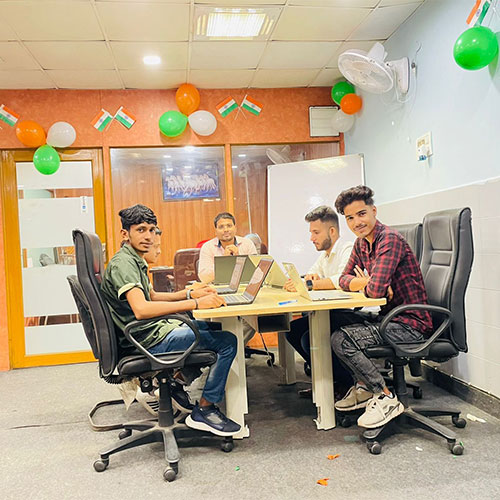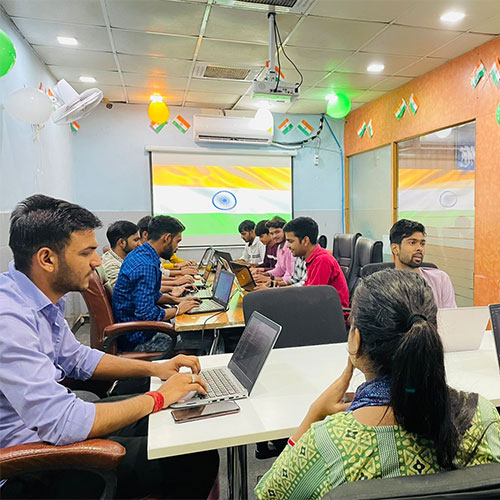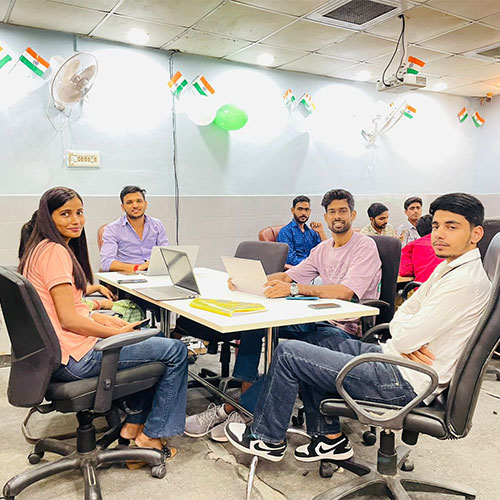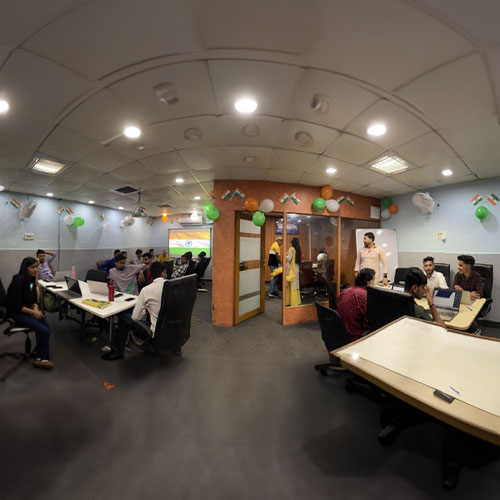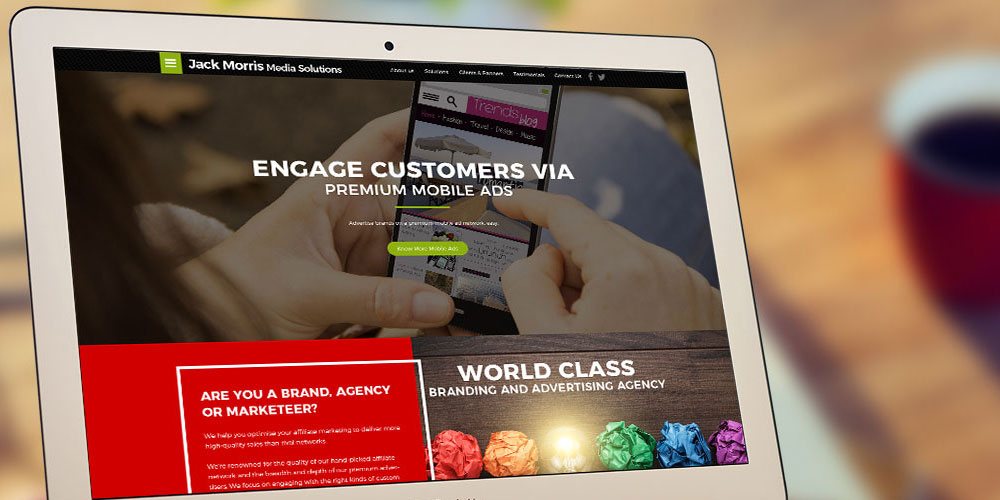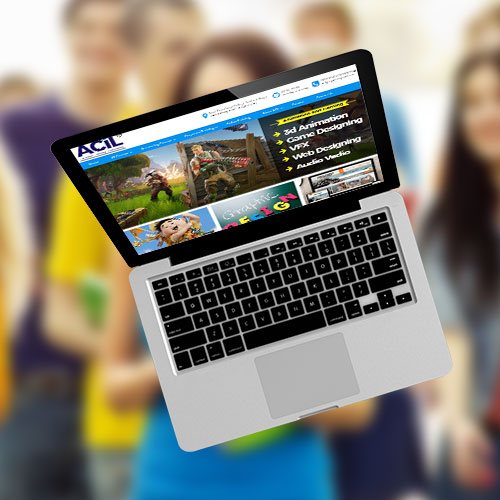What is Frontend
Frontend development, also known as client-side development, is the process of creating the user interface (UI) and user experience (UX) of a website or web application. It involves designing and coding the visual elements that users interact with directly on their browsers. Frontend developers use various technologies like HTML, CSS, and JavaScript to build responsive and engaging web interfaces.
Frontend development focuses on the presentation layer of a website, which includes the layout, design, and interactivity. The main goal of frontend development is to ensure that the user interface is visually appealing, intuitive to use, and provides a seamless experience for the users.
Key Highlights of the Course
- Comprehensive curriculum covering HTML, CSS, JavaScript, React, Angular, and more.
- Hands-on projects to build real-world web applications and enhance practical skills.
- Guidance from experienced industry professionals and seasoned instructors.
- Access to a supportive online community for networking and collaboration.
- Personalized feedback and mentorship to foster continuous improvement.
- In-depth understanding of responsive web design and accessibility principles.
- Exposure to emerging trends in frontend development, such as PWAs and WebAssembly.
- Capstone project to showcase proficiency and demonstrate creativity.
- Flexible learning schedule with self-paced modules for enhanced convenience.
Why choose Frontend Development Course
Choosing frontend development as a career path offers several compelling reasons:
a) Creativity and Design: Frontend developers play a crucial role in creating visually appealing and intuitive user interfaces. It allows individuals to unleash their creativity and design skills to craft unique and user-friendly websites. Working with different design elements, color schemes, and interactive components offers a creative outlet for developers who enjoy visual aesthetics.
b) High Demand: As the internet becomes an essential part of daily life, the demand for skilled frontend developers has soared. Companies across various industries are actively seeking professionals who can build outstanding user experiences. The rise of e-commerce, social media, and web applications has led to a surge in demand for talented frontend developers who can create captivating and functional interfaces.
c) Growing Industry: The technology and web development industry is constantly evolving, leading to new opportunities for frontend developers to stay at the cutting edge of innovation. With the rapid advancement of web technologies, there is always something new to learn and experiment with in frontend development.
d) Work Flexibility: Frontend development often allows for remote work opportunities, making it an attractive choice for those seeking work-life balance. Many companies offer flexible work arrangements, allowing developers to work from anywhere with an internet connection, providing an excellent work-life integration.
Jobs in Frontend Development
The demand for frontend developers continues to rise, with numerous job opportunities available in the job market. Some of the popular job roles in frontend development include:
a) Frontend Developer: The core role involves designing and implementing website interfaces using HTML, CSS, and JavaScript. Frontend developers are responsible for turning design mockups and wireframes into functional web pages, ensuring that the user interface is visually appealing and easy to navigate.
b) UI/UX Designer: Professionals in this role focus on designing intuitive and visually appealing user interfaces and user experiences. They work closely with frontend developers to create wireframes, prototypes, and design mockups that align with the product’s vision and user needs.
c) Web Designer: Web designers work on both the aesthetics and functionality of websites, ensuring they align with the client’s vision and brand identity. They are skilled in using graphic design tools and often collaborate with frontend developers to bring their design concepts to life.
d) Frontend Engineer: Frontend engineers focus on building scalable and maintainable web applications using various frontend frameworks and libraries. They optimize web applications for performance and ensure cross-browser compatibility.
Course Content
A comprehensive frontend development course online should cover a range of topics to equip students with the necessary skills to build dynamic and interactive web applications. The following course content outline provides a balanced combination of fundamental and advanced concepts:
a) HTML Basics:
- Introduction to HTML5
- Document structure and semantics
- Working with text, links, and images
- Forms and user input
- Audio and video integration
b) CSS Fundamentals:
- Styling elements with CSS
- Layout and positioning
- Flexbox and Grid systems
- Responsive design principles
- CSS animations and transitions
c) JavaScript Essentials:
- Introduction to JavaScript
- Variables, data types, and operators
- Functions and scope
- DOM manipulation
- Event handling
d) React.js:
- Introduction to React.js
- Components and props
- State and lifecycle methods
- Routing and navigation
- Building interactive user interfaces with React
e) Angular:
- Introduction to Angular
- Components and templates
- Dependency injection
- Services and HTTP communication
- Forms and validation
Job Responsibilities after placement
Frontend developers have a range of responsibilities to ensure the successful creation and maintenance of web applications:
a) Design Implementation: Translate UI/UX designs into fully functional web interfaces using HTML, CSS, and JavaScript. Frontend developers work closely with UI/UX designers to ensure the visual elements and user interactions align with the design specifications.
b) Responsiveness: Ensure that websites are responsive and optimized for various devices, such as desktops, tablets, and mobile phones. Responsive web design is essential to provide users with a consistent and seamless experience across different screen sizes.
c) Performance Optimization: Optimize frontend code and assets to enhance page loading speed and overall performance. Frontend developers should minimize the use of large files, optimize images, and reduce unnecessary scripts to improve site performance.
d) Cross-Browser Compatibility: Test and ensure compatibility across different web browsers to maintain a consistent user experience. Websites should function correctly on popular browsers such as Chrome, Firefox, Safari, and Edge, among others.
e) Collaboration: Collaborate with UI/UX designers, backend developers, and other stakeholders to deliver cohesive and seamless web applications. Effective communication and teamwork are crucial to ensure the successful completion of web development projects.
f) Bug Fixing and Troubleshooting: Identify and resolve frontend-related issues and bugs to ensure smooth functionality. Frontend developers should conduct thorough testing to identify and address any bugs or errors that may arise during development.
g) Continuous Learning: Stay updated with the latest trends and best practices in frontend development. The technology landscape is constantly evolving, and frontend developers need to stay informed about new tools, libraries, and frameworks to remain competitive in the job market.
Is UI necessary in frontend
User Interface (UI) is a fundamental aspect of frontend development. UI refers to the graphical layout, appearance, and interaction of a website or application. It encompasses the buttons, menus, icons, and other visual elements that users interact with to complete tasks.
UI is crucial because it directly impacts the user experience (UX). A well-designed and intuitive UI can make a website easy to use, encouraging users to stay longer and engage more with the content. On the other hand, a poorly designed UI can lead to frustration and drive users away.
Frontend developers work closely with UI/UX designers to implement the design elements effectively. The collaboration between UI/UX designers and frontend developers ensures that the user interface aligns with the intended user experience and brand identity.
Job Opportunities after the Course
Upon completing the online frontend development course, graduates can explore various job opportunities in the tech industry. Some potential job roles include:
Certifications
Upon successful completion of the online frontend development course, students will receive a recognized certification, highlighting their proficiency in frontend technologies and industry-relevant skills. This certification can boost their employability and credibility in the job market.
Benefits of Doing this Course from Our Institute
- Backup Classes: If students miss any live sessions, they can access recorded lectures for review and continuous learning.
- 24/7 Anytime Support: Our institute offers round-the-clock technical support, ensuring that students can seek assistance whenever they encounter doubts or issues.
- Industry-Experienced Instructors: Our faculty comprises seasoned professionals with extensive experience in frontend development, providing students with insights into current industry practices.
- Practical Oriented Approach: The course focuses on hands-on projects and practical applications, enabling students to build a strong portfolio of projects that showcase their skills to potential employers.
- Career Guidance: Our institute offers personalized career guidance sessions to help students identify the right career path and make informed decisions about their professional journey.
- Collaboration and Networking: Students get the opportunity to collaborate with peers and industry experts, fostering valuable connections within the tech community.
- Continuous Learning: Beyond the course completion, our institute encourages students to engage in continuous learning by offering access to updated course materials and resources.
- Job Interview Preparation: Students receive assistance in preparing for job interviews, including resume building, interview tips, and mock interview sessions.
- Industry-Recognized Certification: Graduates receive an industry-recognized certification upon completion, which can enhance their employability and credibility.
- Flexibility and Convenience: The online format allows students to learn at their own pace, accommodating their existing commitments and work schedules.
Salary Packages in frontend developer jobs
- Entry-Level Frontend Developer (0-2 years of experience): The salary for entry-level frontend developers in India can range from ₹3,00,000 to ₹6,00,000 per year. In some cases, it could be lower or higher depending on the location and demand for developers.
- Mid-Level Frontend Developer (2-5 years of experience): Mid-level frontend developers with a few years of experience can expect a salary in the range of ₹6,00,000 to ₹10,00,000 per year.
- Senior Frontend Developer (5+ years of experience): Senior frontend developers with extensive experience can command salaries ranging from ₹10,00,000 to ₹20,00,000 or more annually.
- Lead Frontend Developer or Frontend Development Manager: Those who move into leadership roles, such as Lead Frontend Developer or Frontend Development Manager, can earn salaries in the range of ₹15,00,000 to ₹30,00,000 or beyond, depending on the company and their responsibilities.
- Freelance Frontend Developers: Freelancers in India have the flexibility to set their rates based on the projects they undertake and their expertise. Freelance frontend developers can earn hourly rates ranging from ₹500 to ₹2,000 or more, depending on their skill level and project complexity.
Can we do full stack Course after frontend development course
Absolutely! Frontend development can be a stepping stone to becoming a full-stack developer. Full-stack developers are proficient in both frontend and backend development, enabling them to build entire web applications from start to finish.
Once you have a strong foundation in frontend development, you can begin learning backend technologies like Node.js, PHP, or Python, and databases like MySQL or MongoDB. Gaining expertise in these areas will make you a versatile developer capable of handling all aspects of web development.
Becoming a full-stack developer offers several advantages, including:
a) Flexibility: Full-stack developers hold the unique capability to manage both frontend and backend operations of web applications. Their comprehensive skill set makes them an indispensable resource, particularly for smaller groups or emerging startups.
b) Complete Understanding: Understanding both frontend and backend allows full-stack developers to have a holistic view of the entire web development process, from the user interface to the server-side logic.
c) Independence: Full-stack developers can work independently and take ownership of the entire development process, from designing the user interface to implementing the backend functionality.
d) Career Growth: Being a full-stack developer opens up a broader range of career opportunities, as you can apply for roles that require both frontend and backend expertise.
Frequenty Asked Questions
1. What is a frontend development course, and who is it for?
A frontend development course is an online learning program that teaches individuals how to design and build user interfaces for websites and web applications. It covers HTML, CSS, JavaScript, and frontend frameworks like React and Angular. This course is ideal for beginners who want to start a career in web development, professionals looking to upskill in frontend technologies, and designers interested in adding interactivity to their designs.
2. Are there any prerequisites for enrolling in a frontend development course?
Most frontend development courses are beginner-friendly and do not require any prior coding knowledge. However, basic computer literacy and familiarity with using the internet and web browsers are beneficial. Some courses may recommend introductory programming concepts, but they are not mandatory.
3. Can I learn frontend development online at my own pace?
Yes, most online frontend development courses offer self-paced learning. You can access the course materials and video lectures at any time and progress through the content at your own speed. This flexibility allows you to balance learning with your other commitments.
4. What topics are covered in a typical frontend development course?
A standard frontend development course covers HTML, CSS, JavaScript, responsive web design, frontend frameworks (React, Angular, etc.), and web accessibility. Some courses may include additional topics like CSS animations, version control, performance optimization, and building real-world projects.
5. How long does it take to complete a frontend development course online?
The duration of a frontend development course varies depending on its depth and complexity. Shorter courses may take a few weeks to complete, while more comprehensive programs can span several months. The duration also depends on your learning pace and the time you dedicate to the course each week.
6. Will I receive a certificate upon completing the course?
Yes, upon successful completion of the frontend development course, you will typically receive a certificate. This certificate validates your achievement and can be included in your resume or portfolio to showcase your skills to potential employers.
7. Can I interact with instructors and fellow learners during the course?
Many online frontend development courses offer opportunities to interact with instructors and fellow learners. Discussion forums, live webinars, and community platforms enable learners to ask questions, seek help, and engage in discussions.
8. What kind of projects will I work on during the course?
Frontend development courses often include hands-on projects to apply the concepts you’ve learned. You might build static web pages, responsive websites, interactive web applications, and even a capstone project that demonstrates your proficiency in frontend development.
9. Is there any job placement assistance provided after completing the course?
Some frontend development course providers offer job placement assistance or career support. They may connect graduates with job opportunities, provide resume reviews, offer interview preparation tips, and share job openings from partner companies.
10. Can I access course materials even after completing the course?
In most cases, you will have access to the course materials even after completing the frontend development course. This allows you to review the content, refer back to resources, and refresh your knowledge whenever needed.
11. How do I know if an online frontend development course is reputable?
To assess the reputation of an online frontend development course, check reviews and ratings from past learners. Look for courses offered by renowned platforms or institutions with a track record of delivering quality content. Seek recommendations from peers or professionals in the industry.
12. Can I upgrade my skills further after completing the frontend development course?
Absolutely! Completing a frontend development course is a great starting point, but the learning journey doesn’t end there. You can explore advanced frontend topics, delve deeper into specific frontend frameworks, and even transition to full-stack development to broaden your skill set further. Continuously updating your skills will keep you relevant in the ever-evolving tech industry.
13. Are there any additional resources or learning materials available for further enrichment?
Many frontend development courses provide supplementary resources such as articles, blogs, and tutorials to complement the main course content. Additionally, you can explore online resources, coding challenges, and open-source projects to continue enhancing your frontend development skills.
14. Is online support available during the course if I encounter difficulties?
Most frontend development courses offer some form of online support. This might include help from instructors, teaching assistants, or a community forum where you can seek assistance if you encounter difficulties or have questions about the course material.
15. Can I get a refund if I am not satisfied with the course?
Refund policies vary among course providers. Before enrolling, check the terms and conditions regarding refunds or free trial periods. Some courses offer a money-back guarantee if you’re not satisfied within a specified time frame.


